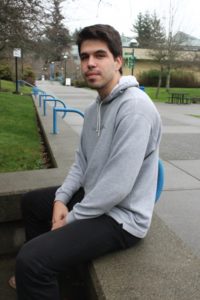Eduardo Bidá recently arrived in Victoria from Brazil and wasted no time integrating himself into the Camosun Chargers men’s volleyball team.
Bidá, 22, was recognized as the Pacific Western Athletic Association male volleyball athlete of the week after just two weeks playing with the Chargers; he also was named a Canadian Collegiate Athletic Association male athlete of the week that same week. He says that it’s great to see his work paying off; however, he doesn’t take all the credit.
“Volleyball is such a collective sport; you cannot win anything without your teammates,” says Bidá.

Bidá found in the Chargers the possibility of aligning his passion for the sport with the opportunity to invest in post-secondary studies.
“I spent four years after high school only playing volleyball,” says Bidá. “I realized that I don’t just want to rely on sports, I want to study to get a degree, and in Brazil, we cannot do both with quality.”
So, Bidá decided to take the future in his hands and started getting in touch with some colleges in Canada. Some positive replies arrived and eventually he chose Camosun, enrolling in the Exercise and Wellness program and becoming a Camosun Charger.
Chargers men’s volleyball coach Charles Parkinson received Bidá’s e-mail to Camosun. Parkinson says that the Chargers looked into Bidá’s experience and thought he could be a nice fit for the team. And they were right.
“He’s fitting in perfectly. He’s exactly like I would expect him to be,” says Parkinson, adding that Bidá brings with him a lot of experience playing at a high level of volleyball. “He is a great player, very skilled; many of the Brazilian players have very good ball control skills. He’s also a furious competitor, he’s very mature, he’s fitting in really, really well, and he’s a great guy as well. We’re really happy.”
However, despite his achievements in this particular sport, volleyball was actually not the first sport that the athlete was interested in.
“I always played football in Brazil,” he says. “But as I was a bigger size, I had to play with the older guys, but then I could not compete with them because I was younger.”
After three years of practicing volleyball in his town, an opportunity appeared to play in a different city.
“That’s when I started my volleyball routine. That’s when I saw that’s what I like to do and what I love to do,” says Bidá.
And that love goes deeper than the training and willpower that motivates Bidá. The volleyball court also represents a deep connection with his biggest motivation: his family.
“I worked so hard to be here, and my mom [did] also,” he says. “My friends and family are so supportive that when I think about them the only thing that comes to my mind is to keep going.”
Moving here brings new challenges to Bidá: he needs to find a way to manage time between school, work, and volleyball practices, all in a new country. It may seem that study and sport are different paths, however, for Bidá, the discipline, determination, and resilience he’s learned through volleyball are transferrable skills for his day-to-day routine.
“Just like in volleyball, we’re going to have ups and downs during life, but you have to keep pushing,” he says. “You can never give up.”
